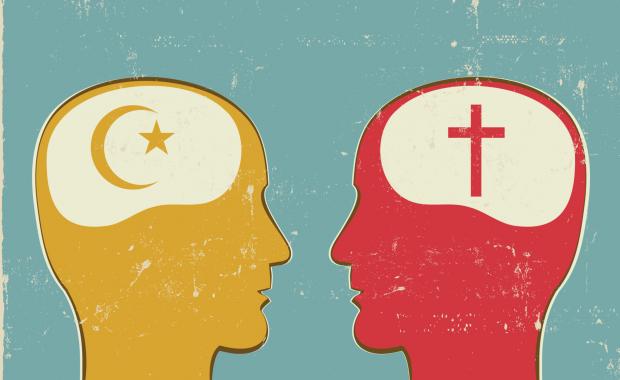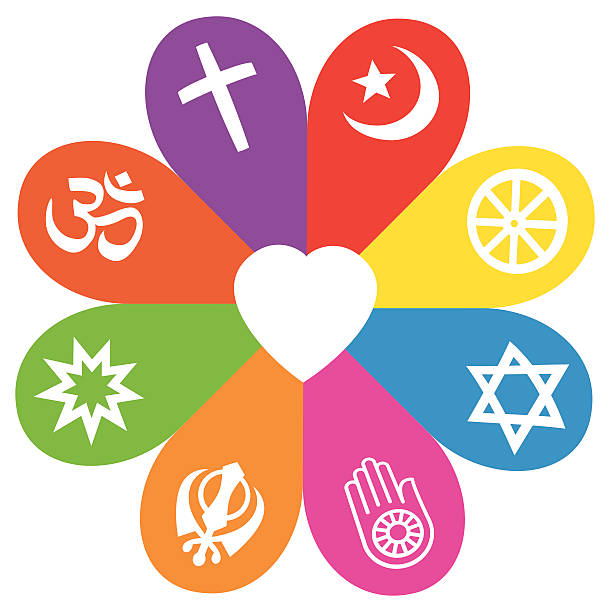What are beliefs and religions?
According to Article 2 of the 2016 Law on Belief and Religion, it is stipulated:
“Religion is human belief expressed through rituals associated with traditional customs and practices to bring spiritual peace to individuals and communities.
Religion is a human belief that exists with a system of concepts and activities including objects of worship, doctrines, canons, rituals and organizations.”

Thus, religion can be understood as a system of cultures, beliefs, and beliefs including specifically designated behaviors and actions, concepts of the world, expressed possibly through scriptures, revelations, religious sites, sayings, moral concepts or organizations associated with supernatural or spiritual elements. Religion is simply understood as human belief in a certain system of concepts and activities. Religious activities in our country are very diverse and rich, we can name some major religions in Vietnam such as: Buddhism, Christianity, Confucianism, Islam,... Freedom to follow or not follow religion are everyone's rights recognized in the Constitution.
Freedom of belief and religion?
The Party's policies and the laws of our State always respect the freedom of belief and religion of all citizens. According to Article 24 of the 2013 Constitution, it is stipulated:
– Everyone has the right to freedom of belief, religion, to follow or not to follow any religion. The religious equality before the law.
– The State respects and protects the right to freedom of belief and religion.
– No one may violate freedom of belief or religion or take advantage of belief or religion to violate the law.
Everyone's right to freedom of belief and religion is based on Article 6 of the 2016 Law on Belief and Religion, which stipulates:
"first. Everyone has the right to freedom of belief, religion, to follow or not to follow any religion.
- Each person has the right to express their beliefs and religion; practice belief and religious rituals; participate in festivals; Study and practice religious doctrine and canons.
- Each person has the right to enter religious establishments, study at religious training establishments, and training classes of religious organizations. When minors enter religious institutions or study at religious training institutions, they must have the consent of their parents or guardians.
- Dignitaries, officials, and monks have the right to perform religious rituals, preach, and evangelize at religious establishments or other legal locations.
- Persons held in custody or temporary detention according to the provisions of law on enforcement of custody and temporary detention; people serving prison sentences; People who are serving the measure of being sent to reformatories, compulsory education establishments, and compulsory detoxification establishments have the right to use scriptures and express their beliefs and religion.
- The Government shall provide detailed regulations on ensuring the implementation of the rights specified in Clause 5 of this Article.”
Thus, all citizens have the obligation to respect freedom of religion and belief, and must not force others to follow or not follow belief or religion. Whether people follow a religion or not does not take away their rights or obligations, and the state recognizes, recognizes, respects and protects everyone's right to freedom of religious belief, ensuring that religions are equal. equality before the law.
What about getting married when the man and woman have different religions?
Clause 2, Article 2 of the Law on Marriage and Family 2014 stipulates: “Marriage between Vietnamese citizens of different ethnicities and religions, between religious people and non-religious people, between believers and non-believers, between Vietnamese citizens and foreigners is allowed. respected and protected by the law.”
Accordingly, respecting the right to freedom of belief and religion of husband and wife is stipulated in Article 22 of the 2014 Law on Marriage and Family as follows: “Husband and wife have the obligation to respect each other's right to freedom of religious belief.”

It can be affirmed that currently Vietnamese law does not have any regulations on restrictions or limitations on marriage between a man and a woman of different religions. Therefore, currently, regarding marriage between men and women of different religions, the law does not have specific regulations, but only general conditions that apply uniformly: the man and woman who want to get married must meet the following conditions: sue and register marriage in accordance with the law.
When getting married, is it mandatory to follow one party's religion?
Prohibited acts are based on Article 5 of the 2016 Law on Belief and Religion, specifically:
“Article 5. Prohibited acts
- Discrimination and discrimination based on belief and religion.
- Forcing, bribing or preventing others from following or not following a belief or religion.
- Insulting beliefs and religions.
- Belief and religious activities:
- a) Violating national defense, security, national sovereignty, social order, safety, and the environment;
- b) Harming social morality; violating body, health, life, property; insulting the honor and dignity of others;
- c) Obstructing the exercise of civic rights and obligations;
- d) Ethnic division; religious division; divide people who follow beliefs and religions from people who do not follow beliefs and religions, between people who follow different beliefs and religions.
- Taking advantage of belief and religious activities for personal gain.”
Therefore, after marriage, one party cannot force the other party to follow their beliefs or religion. However, in reality, there are many cases where marriage of different religions and beliefs is opposed and forced to follow or not follow the religion or belief of one party. Typical examples are:
– Ms. A said: “My husband's family is Protestant. After getting married, my husband and family forced me to follow Protestantism with the reason that if I return to my husband's family, I must follow my husband's family."
– Ms. B said: “I am 25 years old and follow Catholicism, my lover is 27 years old and does not follow any religion. When I was about to get married and asked for permission from my family, his parents suggested that after getting married I should abandon my religion because he was the eldest son in the family and had to worship his ancestors."
It can be seen that there are many cases of being forced to follow one party's religion or belief. In many cases, in order to get married without a certain understanding of the law, many people have decided to abandon their beliefs and religion.
When encountering cases like the above, everyone needs to have appropriate solutions and respect each other. Explanation, sharing, and conversation are essential for an interfaith marriage. When a marriage is legal, the family has no right to prohibit marriage because marriage must be carried out on the principle of voluntariness of both men and women and no one has the right to force or coerce the marriage.
However, we should also learn in advance about our partner's religion as well as clearly understand the regulations of the religion we follow to avoid the risk of conflicts and arguments if we get married in the future. one house. And the special thing is that every religion wants its followers to live peacefully, happily, and happily, so there will be no prohibition on marriage between people of different religions.








